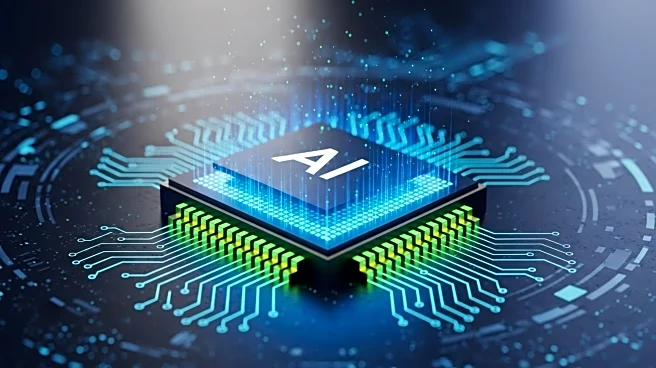What is the story about?
What's Happening?
Advanced Micro Devices (AMD) has secured a significant agreement with OpenAI to supply AI chips, marking a strategic move in the competitive AI chip market. This deal involves OpenAI purchasing 6 gigawatts of AMD's AI chips over multiple years, which is expected to generate substantial revenue for AMD. The agreement also includes OpenAI acquiring warrants for AMD common stock, potentially leading to OpenAI owning approximately 10% of AMD. This development comes as AMD aims to challenge Nvidia's dominance in the AI chip sector, particularly in the inference process of running AI models. Nvidia, historically strong in AI model training, has also invested $100 billion in OpenAI to expand its AI data center capacity. Despite AMD's stock surge, Nvidia remains a key player, with its annual revenue projected to exceed $200 billion, driven by the AI boom.
Why It's Important?
The deal between AMD and OpenAI signifies a shift in the AI chip market dynamics, potentially altering competitive landscapes. AMD's entry into the inference market challenges Nvidia's established position, offering OpenAI alternative chip solutions. This could lead to increased competition and innovation in AI technologies, benefiting industries reliant on AI advancements. The financial implications for AMD are substantial, with projected revenue increases from the deal. For Nvidia, the investment in OpenAI underscores its commitment to maintaining leadership in AI infrastructure, despite AMD's growing presence. The broader impact includes potential shifts in stock valuations and strategic partnerships within the semiconductor industry, influencing market strategies and technological developments.
What's Next?
As AMD and OpenAI deepen their collaboration, the semiconductor industry may witness further strategic alliances and investments. AMD's focus on inference chips could lead to advancements in AI applications, enhancing capabilities across various sectors. Nvidia's continued investment in AI infrastructure suggests ongoing efforts to expand its technological offerings and maintain market leadership. Stakeholders, including investors and tech companies, will likely monitor these developments closely, assessing impacts on stock performance and industry trends. The evolving competitive landscape may prompt other companies to explore similar partnerships, driving innovation and growth in AI technologies.
Beyond the Headlines
The AMD-OpenAI deal highlights ethical considerations in AI development, particularly regarding data usage and model training. As AI technologies advance, companies must address concerns about data privacy and algorithmic transparency. The partnership also reflects broader cultural shifts towards AI integration in everyday applications, influencing societal norms and expectations. Long-term, the deal could accelerate AI adoption across industries, prompting discussions on regulatory frameworks and ethical guidelines to ensure responsible AI deployment.
















